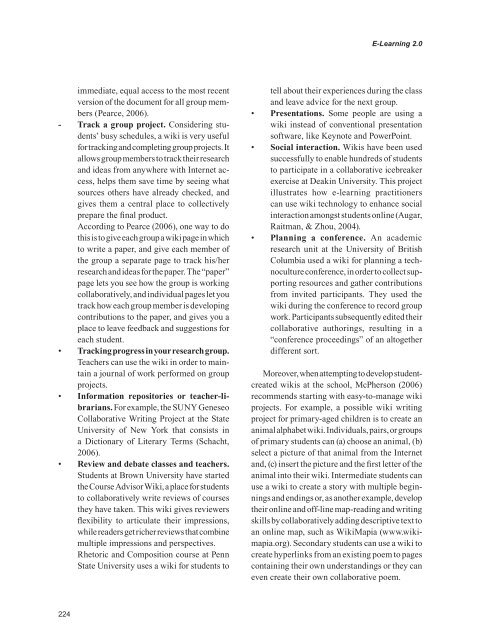Advances in E-learning-Experiences and Methodologies
You also want an ePaper? Increase the reach of your titles
YUMPU automatically turns print PDFs into web optimized ePapers that Google loves.
E-Learn<strong>in</strong>g 2.0<br />
immediate, equal access to the most recent<br />
version of the document for all group members<br />
(Pearce, 2006).<br />
- Track a group project. Consider<strong>in</strong>g students’<br />
busy schedules, a wiki is very useful<br />
for track<strong>in</strong>g <strong>and</strong> complet<strong>in</strong>g group projects. It<br />
allows group members to track their research<br />
<strong>and</strong> ideas from anywhere with Internet access,<br />
helps them save time by see<strong>in</strong>g what<br />
sources others have already checked, <strong>and</strong><br />
gives them a central place to collectively<br />
prepare the f<strong>in</strong>al product.<br />
Accord<strong>in</strong>g to Pearce (2006), one way to do<br />
this is to give each group a wiki page <strong>in</strong> which<br />
to write a paper, <strong>and</strong> give each member of<br />
the group a separate page to track his/her<br />
research <strong>and</strong> ideas for the paper. The “paper”<br />
page lets you see how the group is work<strong>in</strong>g<br />
collaboratively, <strong>and</strong> <strong>in</strong>dividual pages let you<br />
track how each group member is develop<strong>in</strong>g<br />
contributions to the paper, <strong>and</strong> gives you a<br />
place to leave feedback <strong>and</strong> suggestions for<br />
each student.<br />
• Track<strong>in</strong>g progress <strong>in</strong> your research group.<br />
Teachers can use the wiki <strong>in</strong> order to ma<strong>in</strong>ta<strong>in</strong><br />
a journal of work performed on group<br />
projects.<br />
• Information repositories or teacher-librarians.<br />
For example, the SUNY Geneseo<br />
Collaborative Writ<strong>in</strong>g Project at the State<br />
University of New York that consists <strong>in</strong><br />
a Dictionary of Literary Terms (Schacht,<br />
2006).<br />
• Review <strong>and</strong> debate classes <strong>and</strong> teachers.<br />
Students at Brown University have started<br />
the Course Advisor Wiki, a place for students<br />
to collaboratively write reviews of courses<br />
they have taken. This wiki gives reviewers<br />
flexibility to articulate their impressions,<br />
while readers get richer reviews that comb<strong>in</strong>e<br />
multiple impressions <strong>and</strong> perspectives.<br />
Rhetoric <strong>and</strong> Composition course at Penn<br />
State University uses a wiki for students to<br />
tell about their experiences dur<strong>in</strong>g the class<br />
<strong>and</strong> leave advice for the next group.<br />
• Presentations. Some people are us<strong>in</strong>g a<br />
wiki <strong>in</strong>stead of conventional presentation<br />
software, like Keynote <strong>and</strong> PowerPo<strong>in</strong>t.<br />
• Social <strong>in</strong>teraction. Wikis have been used<br />
successfully to enable hundreds of students<br />
to participate <strong>in</strong> a collaborative icebreaker<br />
exercise at Deak<strong>in</strong> University. This project<br />
illustrates how e-learn<strong>in</strong>g practitioners<br />
can use wiki technology to enhance social<br />
<strong>in</strong>teraction amongst students onl<strong>in</strong>e (Augar,<br />
Raitman, & Zhou, 2004).<br />
• Plann<strong>in</strong>g a conference. An academic<br />
research unit at the University of British<br />
Columbia used a wiki for plann<strong>in</strong>g a technoculture<br />
conference, <strong>in</strong> order to collect support<strong>in</strong>g<br />
resources <strong>and</strong> gather contributions<br />
from <strong>in</strong>vited participants. They used the<br />
wiki dur<strong>in</strong>g the conference to record group<br />
work. Participants subsequently edited their<br />
collaborative author<strong>in</strong>gs, result<strong>in</strong>g <strong>in</strong> a<br />
“conference proceed<strong>in</strong>gs” of an altogether<br />
different sort.<br />
Moreover, when attempt<strong>in</strong>g to develop studentcreated<br />
wikis at the school, McPherson (2006)<br />
recommends start<strong>in</strong>g with easy-to-manage wiki<br />
projects. For example, a possible wiki writ<strong>in</strong>g<br />
project for primary-aged children is to create an<br />
animal alphabet wiki. Individuals, pairs, or groups<br />
of primary students can (a) choose an animal, (b)<br />
select a picture of that animal from the Internet<br />
<strong>and</strong>, (c) <strong>in</strong>sert the picture <strong>and</strong> the first letter of the<br />
animal <strong>in</strong>to their wiki. Intermediate students can<br />
use a wiki to create a story with multiple beg<strong>in</strong>n<strong>in</strong>gs<br />
<strong>and</strong> end<strong>in</strong>gs or, as another example, develop<br />
their onl<strong>in</strong>e <strong>and</strong> off-l<strong>in</strong>e map-read<strong>in</strong>g <strong>and</strong> writ<strong>in</strong>g<br />
skills by collaboratively add<strong>in</strong>g descriptive text to<br />
an onl<strong>in</strong>e map, such as WikiMapia (www.wikimapia.org).<br />
Secondary students can use a wiki to<br />
create hyperl<strong>in</strong>ks from an exist<strong>in</strong>g poem to pages<br />
conta<strong>in</strong><strong>in</strong>g their own underst<strong>and</strong><strong>in</strong>gs or they can<br />
even create their own collaborative poem.


